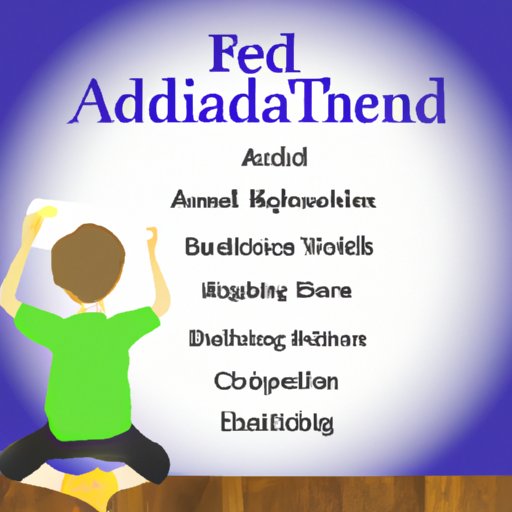Introduction
Attention Deficit Hyperactivity Disorder (ADHD) is a neurological disorder that affects up to 11% of children worldwide and 4.4% of adults in the United States. Symptoms include difficulty concentrating, poor impulse control, hyperactivity, and impulsivity. While there is no cure for ADHD, there are various treatments available to help manage symptoms.
The most effective treatment for ADHD will depend on the individual’s needs and age. In general, a combination of medication, behavioral therapy, and lifestyle changes can be effective. Additionally, some individuals may find relief from alternative treatments such as neurofeedback or herbal remedies.

Exploring Different Types of Medication and Therapies for ADHD
Medication is one of the most commonly used treatments for ADHD. Stimulants, such as methylphenidate and amphetamines, are the most widely prescribed medications for ADHD. These medications work by increasing levels of the neurotransmitters dopamine and norepinephrine in the brain, which helps to improve focus and reduce hyperactivity.
Non-stimulant medications are also available for those who cannot tolerate stimulants or for whom stimulants have not been effective. These medications include atomoxetine, guanfacine, and bupropion. Non-stimulants work by increasing levels of serotonin, another neurotransmitter that helps regulate mood and behavior.
Behavioral therapy is another option for treating ADHD. Behavioral therapy involves teaching children strategies to manage their symptoms and helping them develop new skills. It also includes parent training, which focuses on educating parents about ADHD and helping them to establish consistent rules and expectations.
Analysis of Recent Research on Treating ADHD
Recent research has shown that medication can be an effective treatment for ADHD. Studies have found that stimulants can reduce symptoms of hyperactivity, impulsivity, and inattention in up to 80% of children with ADHD. Additionally, non-stimulant medications can also be effective in reducing symptoms.
Research has also found that behavioral therapy can be beneficial for individuals with ADHD. Studies have shown that this type of therapy can improve symptoms of ADHD, including impulsivity, inattention, and hyperactivity. In addition, it can help to reduce disruptive behaviors and improve social skills.
Examining the Pros and Cons of Behavioral Therapy for ADHD
Behavioral therapy can be beneficial for individuals with ADHD, but it is important to understand the pros and cons before beginning treatment. One of the main benefits of behavioral therapy is that it can teach individuals how to better manage their symptoms. Additionally, it can help to reduce disruptive behaviors, improve social skills, and improve academic performance.
However, there are some challenges associated with behavioral therapy. It requires a significant commitment of time and energy and can be expensive. Additionally, results may not be immediate, and it may take some time to see improvement in symptoms.
Investigating Alternative Treatments for ADHD
In addition to medication and behavioral therapy, there are a number of alternative treatments for ADHD. Diet and exercise can be effective in managing symptoms. Certain nutrient deficiencies, such as zinc, omega-3 fatty acids, and iron, have been linked to ADHD, and eating a balanced diet can help to reduce symptoms. Regular physical activity can also help to reduce hyperactivity and improve concentration.
Herbal remedies, such as ginkgo biloba and St. John’s wort, have also been used to treat ADHD. While these remedies may be helpful, it is important to speak to a medical professional before using any herbal remedy. Neurofeedback is another alternative treatment that has been found to be effective in reducing symptoms of ADHD.

Evaluating the Impact of Diet and Exercise on ADHD Symptoms
Diet and exercise can both be beneficial for individuals with ADHD. Eating a balanced diet that is rich in fruits, vegetables, and lean proteins can help to ensure that individuals are getting all the necessary nutrients. Additionally, regular physical activity can help to reduce hyperactivity and improve concentration.
It is important to note, however, that diet and exercise should be used in conjunction with other treatments. While they can be beneficial, they may not be enough to completely manage symptoms of ADHD.

Understanding the Role of Parental Involvement in ADHD Treatment
Parental involvement is an important part of any treatment plan for ADHD. Parents can provide support and education to their child, as well as set boundaries and expectations. Additionally, they can work with the child’s doctor to create an individualized treatment plan.
Parents can also help to ensure that their child is following through with treatment. This includes making sure that the child takes any prescribed medications, attends therapy sessions, and follows any dietary or exercise recommendations.
Conclusion
ADHD is a common disorder that can affect children and adults alike. While there is no cure for ADHD, there are various treatments available to help manage symptoms. The most effective treatment for ADHD will depend on the individual’s needs and age, but in general, a combination of medication, behavioral therapy, and lifestyle changes can be effective. Additionally, some individuals may find relief from alternative treatments such as neurofeedback or herbal remedies.
Finally, parental involvement is an important part of any treatment plan for ADHD. Parents can provide support and education to their child, as well as set boundaries and expectations. By working together with their child’s doctor, parents can create an individualized treatment plan that is most likely to be successful.


